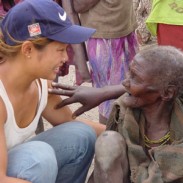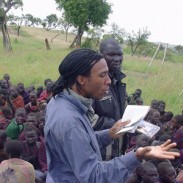You are here
Family Care Uganda - Outreach Sponsorship
Recently Family Care Uganda, a project supported by Activated ministries, was contacted by Richard and Sally Hoffman, who had been missionaries to the Ik some 10 years earlier, asking if they would consider helping to record Bible stories in Icetot (pronounced i-che-tot) the language of the Ik tribe. Following is an account given by a volunteer at Family Care Uganda detailing this project and their first visit to meet the Ik:
“The Ik people are an amazing remote and endangered tribe living on the peaks of mountains along the far Northern Ugandan/Kenyan border. These people have only recently been developing a written language. The Hoffmans also contacted another audio Scripture ministry in the USA, and requested that 35 hand-cranked tape recorders be sent to Family Care Uganda’s team after educated tribesman John Mark Lomeri had recorded 3 hours of relatable Bible stories for the first time in Icetot.
The next challenge was getting these tapes and tape-recorders to the Ik people, since it would necessitate traveling for days across Karamoja, a district in Eastern Uganda which can be quite hostile. AK47s have replaced the original bows & arrows used during the cattle raids of the Karimojong, and anyone traveling during the day time could be very subject to ambush, robbery and worse.
We were counseled to travel therefore at night for the first sector as the Karimojong tend to return to their highly fenced kraals for protection from leopards and hyenas, rather than risk being vulnerable. The rough roads were a challenge for our faithful old Nissan Safari jeep, but we managed to navigate the distance, checking in with local regional directors and overseers along the way. The Turkana tribe in Kenya had recently raided the Dodoth Karimojong, so revenge cattle raids were expected at any time. Fifty people had been sadly killed in the course of the last raid four days before our trip, so we desperately asked God’s guidance and protection.
John Mark had extreme skill in navigating, because once we had left Kaabong, the last town on the way north, & then past Kalipata, the last tiny Karimojong village, the roads were almost totally indecipherable, apart from his expert experience & sense. The area during this time was extremely dry, with rains not having fallen in over 7 months. We navigated to small Ik communities in Lokwakaramoe, Kamion, and Timu, the last having been raided and many huts and community areas burned by the Turkana only days before we arrived.
We prayed for all the attendees of the meetings we held at each settlement for salvation and any healing requests they had. We also prayed desperately for rain as it had been such a long drought and these dear people were really suffering. At the end of our second meeting from a completely clear sky, white clouds began to form and by the time we were back on the road the sky began to rumble and rain fell heavily! It was thrilling to us to see such specific answers to our prayers in the other two communities we stayed with also–just as we were leaving each time!
The Ik people were poorly represented in a book called “The Mountain People” written by Colin Turnbull in 1972 As a result of his book, the Ik are studied in universities today by sociology students as being “The Tribe With No Love” and “The People Who Don’t Sing”. We found these claims to be entirely unfounded and were most impressed by their incredible peaceful ethic. They actually have one of the most caring societies in many respects in terms of resolving conflicts. If a disagreement was to begin, rather than argue, one of the two involved will simply walk out of the hut, to enable peace to remain and the issues are settled later when they are less emotionally charged.
To be sure, the Ik have not been easy to reach, for their villages lie at the end of miles of obscure foot paths through head-high elephant grass in a section of Uganda made dangerous by cattle raids and not infrequent guerrilla warfare. They also migrate between the mountains and the plains of Kidepo and Turkana.
We believe the tapes and players we took to them will aid them in learning their newly developed written language. The fact that we were able to strengthen them spiritually, when they had been fearful and had said that both God and man had forgotten them, is a great encouragement to them. Along with this we were also able to bring donated medicines for flu and malaria as well as school supplies for 700 students at the 2 schools in the region.”
Activated Ministries would like to say a special thanks to our sponsors and donors who help to make projects like Family Care Uganda possible.
Family Care Uganda is a registered NGO supported by Activated Ministries and has been in operation in Uganda since 1999. Family International missionaries there work hard on a wide range of projects that help the people of Uganda and we at Activated Ministries are proud to partner with you in making projects like Family Care Uganda possible. Visit www.activatedministries.org for more exciting updates from this dedicated team of volunteers!




